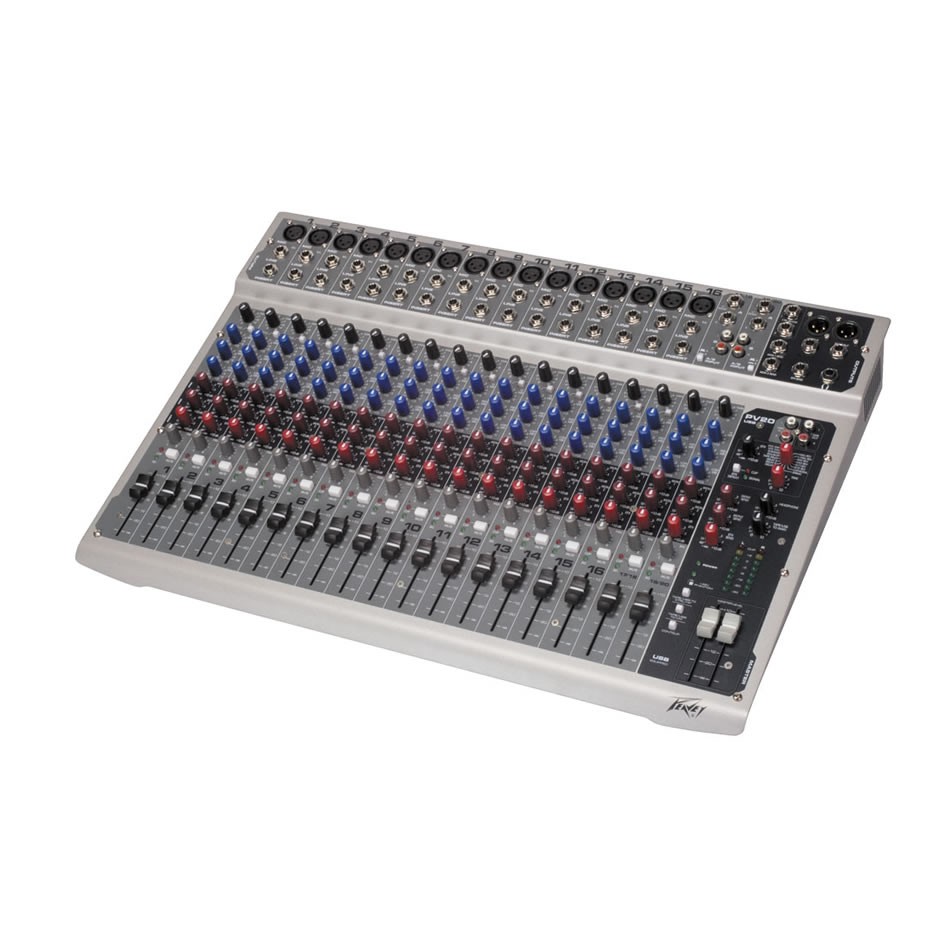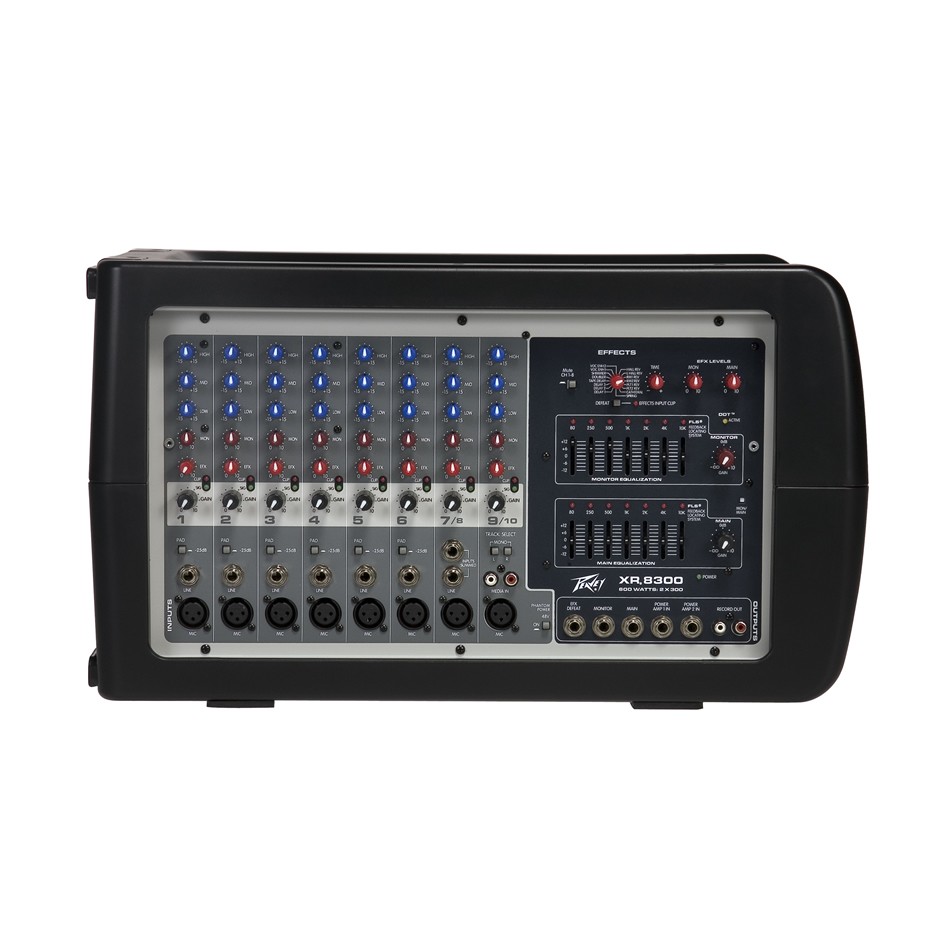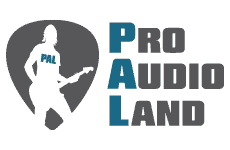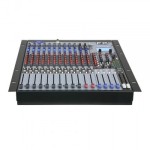Language
The Key Differences Between Live And Studio Mixers
When you take a look at the big picture, the primary job of live sound mixers and studio mixers is the same – to combine signals and route them where they need to go. That said, they do feature key differences, all of which stem from how they differ in their intended use – recording versus live sound management. Once you begin to look at mixers with that in mind, you'll notice how much they are tailored to best suit their application. Below, we take a look at these key differences.
 In order to accommodate extensive monitoring needs, studio mixers (such as the Peavey PV 20 Studio Mixer above) can be found featuring a wider selection of inputs, master controls and settings than typical live mixers.[/caption]
In order to accommodate extensive monitoring needs, studio mixers (such as the Peavey PV 20 Studio Mixer above) can be found featuring a wider selection of inputs, master controls and settings than typical live mixers.[/caption]
 Many live sound mixers, such as the Peavey XR 8300 8-Channel Powered Mixer shown above, are made with rugged portability in mind.[/caption]
Hopefully, after reading the info above, you have a better understanding of what separates a studio mixer from a live sound one and how they are each tailored to work with their main jobs in mind. So, would you be able to use a studio mixer in a live situation or vice-versa? Sure, as long as it had all the inputs and outputs that you'd need. It might not be optimal, but it would probably work. But if you want to take full advantage a live or studio mixer's features, we recommend you get the right one for the right job!
If you're in the market for either, check out the links below. We'll make sure to get you a great deal! And if you have any questions or concerns regarding the purchase of mixer or any other piece of gear we carry, don't hesitate to chat with one of our friendly PAL pros by using the live chat feature below or by calling us toll-free at 1 877-671-2200!
Many live sound mixers, such as the Peavey XR 8300 8-Channel Powered Mixer shown above, are made with rugged portability in mind.[/caption]
Hopefully, after reading the info above, you have a better understanding of what separates a studio mixer from a live sound one and how they are each tailored to work with their main jobs in mind. So, would you be able to use a studio mixer in a live situation or vice-versa? Sure, as long as it had all the inputs and outputs that you'd need. It might not be optimal, but it would probably work. But if you want to take full advantage a live or studio mixer's features, we recommend you get the right one for the right job!
If you're in the market for either, check out the links below. We'll make sure to get you a great deal! And if you have any questions or concerns regarding the purchase of mixer or any other piece of gear we carry, don't hesitate to chat with one of our friendly PAL pros by using the live chat feature below or by calling us toll-free at 1 877-671-2200!
Different Purpose, Different Features
As mentioned above, the differences between a live and studio mixer come down to the difference in their main purpose. For example, a live mixer’s input signals are usually combined and sent to a limited number of places, usually the main PA speakers, floor monitors and maybe balcony speakers (if they’re used). A studio mixer also mixes input signals together and sends them to a few places (such as studio monitors and a mixdown deck), but it is also more than likely connected to a multitrack recorder, which needs its own inputs, outputs, and routing controls. The need for a studio mixer to work with a multitrack recorder, not to mention the importance of getting the best signal possible out of it, is one of the biggest differences between the two. Furthermore, studio mixers also tend to feature more monitoring capabilities (for different sets of studio monitors, headphones for each performer, etc.) along with a comparatively more robust master section that includes comprehensive talkback features, a bigger selection of inputs and more. [caption id="attachment_5520" align="alignnone" width="950"] In order to accommodate extensive monitoring needs, studio mixers (such as the Peavey PV 20 Studio Mixer above) can be found featuring a wider selection of inputs, master controls and settings than typical live mixers.[/caption]
In order to accommodate extensive monitoring needs, studio mixers (such as the Peavey PV 20 Studio Mixer above) can be found featuring a wider selection of inputs, master controls and settings than typical live mixers.[/caption]
Closing The Gap
Historically, studio mixers were always of higher quality than live mixers, and so, produced better sound. And while this is still true today in some circumstances, advancements in technology (as well as lowered costs) have closed that gap significantly, as both now feature similar high-quality designs and signal processing. Still, the nature of recording means that the audio signals passing through studio mixers are under much greater scrutiny than those of live mixers. Studio mixers were also the first to feature exhaustive automation capabilities. But just like with the quality gap, live mixers now feature their own forms of automation as well.With Live Sound In Mind
While it might seem like studio mixers tend to get all of the extra capabilities, live mixers can also ship with certain things you won’t find elsewhere. For example, some modern live mixers feature group matrix mixing, made to make it easier for sound guys to send mixes to different locations in a venue. Some live mixers also feature other convenient capabilities, such as VCA groups, which allow you to control the volumes of multiple independent sources through a single control fader, without the need of having to route them all through the same subgroup. This type of feature isn’t usually needed in a studio mixer because of automation. And finally, live mixers are also usually built with portability in mind, meaning they tend to feature rugged yet compact construction. [caption id="attachment_5519" align="alignnone" width="950"] Many live sound mixers, such as the Peavey XR 8300 8-Channel Powered Mixer shown above, are made with rugged portability in mind.[/caption]
Hopefully, after reading the info above, you have a better understanding of what separates a studio mixer from a live sound one and how they are each tailored to work with their main jobs in mind. So, would you be able to use a studio mixer in a live situation or vice-versa? Sure, as long as it had all the inputs and outputs that you'd need. It might not be optimal, but it would probably work. But if you want to take full advantage a live or studio mixer's features, we recommend you get the right one for the right job!
If you're in the market for either, check out the links below. We'll make sure to get you a great deal! And if you have any questions or concerns regarding the purchase of mixer or any other piece of gear we carry, don't hesitate to chat with one of our friendly PAL pros by using the live chat feature below or by calling us toll-free at 1 877-671-2200!
Many live sound mixers, such as the Peavey XR 8300 8-Channel Powered Mixer shown above, are made with rugged portability in mind.[/caption]
Hopefully, after reading the info above, you have a better understanding of what separates a studio mixer from a live sound one and how they are each tailored to work with their main jobs in mind. So, would you be able to use a studio mixer in a live situation or vice-versa? Sure, as long as it had all the inputs and outputs that you'd need. It might not be optimal, but it would probably work. But if you want to take full advantage a live or studio mixer's features, we recommend you get the right one for the right job!
If you're in the market for either, check out the links below. We'll make sure to get you a great deal! And if you have any questions or concerns regarding the purchase of mixer or any other piece of gear we carry, don't hesitate to chat with one of our friendly PAL pros by using the live chat feature below or by calling us toll-free at 1 877-671-2200!

